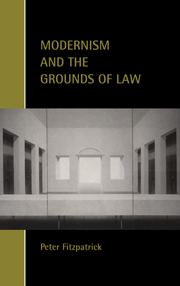1 - Origin
Published online by Cambridge University Press: 05 July 2014
Summary
1st Gent. An ancient land in ancient oracles
Is called ‘law-thirsty’: all the struggle there
Was after order and a perfect rule.
Pray, where lie such lands now? …
2nd Gent. Why, where they lay of old – in human souls.
(George Eliot 1965: 98)PARRICIDE
Parricide has more than once provided an histrionic beginning but here it will be approached in a suitably muted manner. Slavoj Zizek castigates significant anthropologists for questioning the universality of the Oedipus complex, for asserting that it did not afflict the people they studied. Yet what provokes Zizek here is not so much the substance of the claim by the anthropologists but that in making it they do not put their own position in question (Zizek 1991a: 102). And putting our position in question is what Zizek advances the Freud of Totem and Taboo as doing (Freud 1960).
That putting in question will be the leitmotif of this first chapter. True, in Totem and Taboo, Freud constantly, if not always deliberately, puts our position in question. But at the same time, in his discovering the origin of our social being, Freud sought also to position our present existence. Somewhat more obliquely, he addresses as well the question of how we can be ‘of’ something, how it can be ours, yet also and always be beyond us. We speak readily enough of our society, of our community, even of our law, all the while recognizing that these things somehow subsist beyond us.
- Type
- Chapter
- Information
- Modernism and the Grounds of Law , pp. 11 - 36Publisher: Cambridge University PressPrint publication year: 2001



